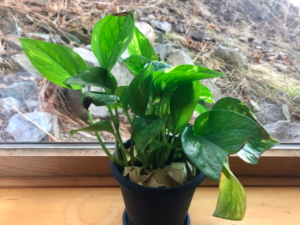Total Eclipse of the Plant by Andrea Aviles
One morning I woke up and glanced over to my window. To my surprise, I noticed how my favorite plant, my golden photos, was dying. An upset feeling washed over me. How was this possible if yesterday she was perfectly normal? I watered her regularly, sang to her, and made sure she received any available sunlight. I glanced away, exasperated. That night, sleep came late, as I drifted into my own speculative thoughts. What did I do wrong? Could it be that my plant child is the foreteller of an ominous occurrence?
At that moment, three months of my AmeriCorps service year had passed. I had decided to switch my suburban life in California to a mountainous rural one in Montana. I was excited to serve first-generation, low-income students of the Flathead Reservation by providing them with support in their preparation for college entrance. My service term started favorably, but as my attempts to reach students became futile, my enthusiasm decreased. As the semester progressed, my colleagues and I made every effort to communicate with students, parents, and teachers.
However, the lack of response became the norm. The recent tragedies of accidents, suicides, and fires in the reservation seemed to cast an even extra somber mood onto a community already suffering from collective pandemic fatigue. Soon enough, I found myself unable to implement essential tasks due to non-responsiveness. I was in a constant state of waiting. Intrusive thoughts plagued my mind: “I’m not doing enough”, “I should be zigzagging through limitations and constraints”. Adaptability became a sounding voice in my head. The whole world has been able to adapt to meet new challenges brought by an international health crisis yet I’m incapable of doing so? Substantially, I began to feel anxious and lost. Brainstorming potential solutions and executing them often ended in unsuccessful outcomes. Like my plant, I had begun to wane. Together with the constant political turmoil that seemed to cause yet another layer of tension, I felt blocked.
Often at night, I found myself staring at the ceiling, wondering if I made the right decision. Preventing even the soothing voice of reason to have any influence over my subconscious.
A couple of days after my plant’s unfortunate condition, I watched an Instagram story of one of my favorite tarot readers, in which a girl recommended boiled eggshells be put in a plant’s soil to bring it back to life.
I decided to give it a try. By late night there was no significant change; if anything, it looked worse. I was quite sad my favorite plant was withering and I, a mere witness to its absence of recovery, just stood there, inefficiencies and powerlessness exposed. I went to bed feeling defeated both by the challenges of my service year and my green friend’s decay.
The next morning, I was abruptly awakened by the cat jumping onto my bed. Hurriedly shrugging him off, I reached for my glasses and opened the curtains. Surprisingly, my golden photos stood triumphantly on my windowsill, ever greener. A beautiful phenomenon.
Reflecting on this situation, it seems sometimes the environment we operate under, challenges our peace. Just like anything we want to sustain in our lives, we have to learn how to nurture them while taking a moment to move with the seasons. Sometimes we need to recover and recalibrate our strategies.
Every now and then, they have a way of finding us through an unexpected channel and teaching us a lesson. I took this as a need to respect our limitations and constraints in order to release and cultivate new cycles of change. Good things can be heavy too. Understanding that collectively, we need to slow down and assess new perspectives means that maybe we won’t end up doing what we initially sought out to do, and that is okay. Unpredictability has become a recurrent theme these past few months. Occasionally, we have to be okay with not being in control and to surrender. Stillness beyond physical non-movement is required to hold space for both our fears and visions. Understanding that youth and adults are at different stages of emotional landscapes helps me channel my anxiety and uncertainty into compassion and patience. We are all collectively healing, growing, and evolving, even if it does not feel like it. Staying consistent and accountable even if it takes longer is crucial. When we hold space for empathy and support, we exist in our truth and by doing so, we are of service to ourselves and others.
So, even if my plant does not survive, my devotion to tending and caring does. Like the ongoing pandemic and political events, she reminds me just how fragile our existence, plans, and structures can be. The mourning of their failures leaves room for proper examinations needed to conjure our inner potential and morph it into authentic, illustrious improvements.
 Blog Posts
Blog Posts 
